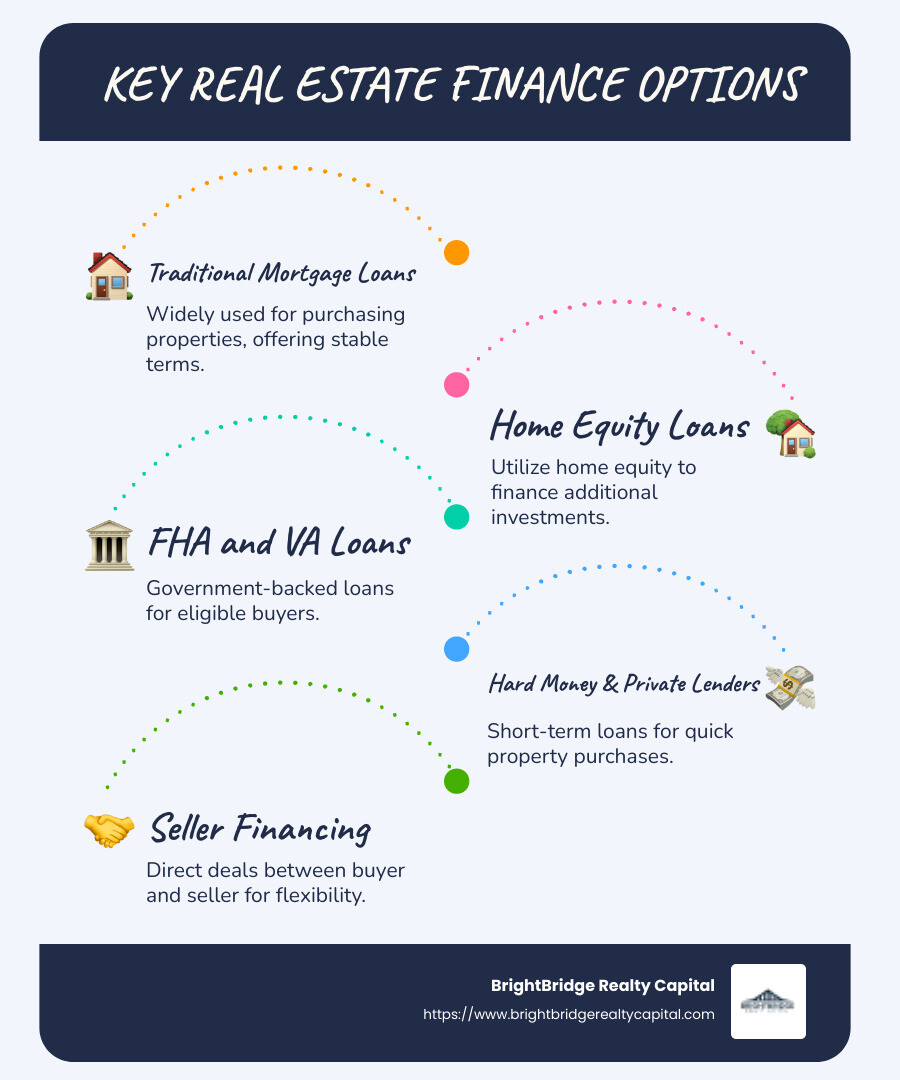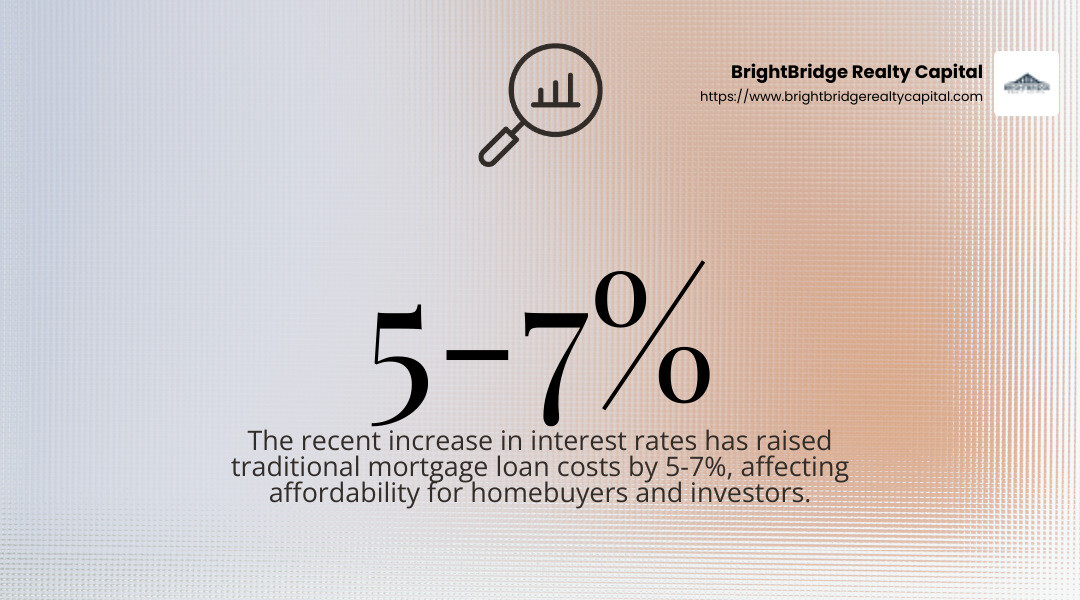Navigating the Maze: Top Real Estate Financing Options

For anyone stepping into real estate, understanding real estate finance options is a game-changer. Whether you're an investor eager to expand your rental portfolio or someone looking to start on a fix-and-flip project, knowing your financing choices is crucial.
Quick Overview of Real Estate Finance Options:
- Traditional Mortgage Loans - The most common and widely understood option.
- Home Equity Loans - Leverage your home for additional funds.
- FHA and VA Loans - Government-backed loans with specific eligibility.
- Hard Money and Private Money Lenders - Fast but often expensive solutions.
- Seller Financing - Direct agreements between buyer and seller.
- Peer-to-Peer Lending - Modern platforms offering flexible terms.
Real estate financing can open myriad opportunities beyond just buying a home. It supports broader visions like investment properties, enabling diversification of portfolios. As noted by LexisNexis, traditional methods like lending against rental income remain popular, but a suite of innovative financing solutions now offers more custom and accessible opportunities.
In the real estate landscape, having a clear grasp of your financing options can mean the difference between seizing a lucrative opportunity or watching it slip by.

Simple Real estate finance options word guide:
Understanding Real Estate Finance Options
Navigating real estate finance can feel like a maze. But understanding your options, from traditional to alternative financing, can make the journey smoother.
Traditional Financing
Traditional Mortgage Loans are the go-to for many homebuyers and investors. These loans are offered by banks and credit unions and typically require a good credit score and a down payment. They come with structured repayment schedules that make budgeting easier. However, with recent rises in interest rates, the cost of borrowing has increased, impacting the affordability of traditional loans.

Alternative Financing
When traditional loans aren't an option, alternative financing steps in. This includes hard money loans, which are short-term and secured by real estate. They’re popular for quick flips and renovations but come with higher interest rates. Private money lenders also fall under this category, offering flexibility but often at a premium.
Another alternative is mezzanine financing. This is a hybrid of debt and equity financing, providing more capital than a bank loan. It's useful for big projects but comes with higher costs.
Cash Financing
Some investors prefer cash financing, using their own funds to purchase properties outright. This method eliminates the need for loan approvals, interest payments, and closing costs. It also strengthens your negotiating position, as sellers often favor cash deals for their speed and certainty.
In summary, choosing the right real estate finance options depends on your financial situation, credit score, and investment goals. Whether sticking with traditional loans or exploring alternatives, understanding these options empowers you to make informed decisions in the real estate market.
Top Real Estate Financing Options
When it comes to funding your real estate ventures, understanding the variety of real estate finance options available is crucial. Let's explore some of the top choices that can help you secure the property of your dreams.
Traditional Mortgage Loans
Conventional loans are a staple in the real estate world. They require a good credit score and a down payment, often around 20%. These loans are not backed by the government, allowing for more flexibility in terms and conditions. However, they do come with stricter qualification criteria compared to government-backed loans.
Government-backed loans, like those from the Federal Housing Administration (FHA) and the Department of Veterans Affairs (VA), offer advantages for specific groups. FHA loans are ideal for those with lower credit scores or limited down payment resources. VA loans, on the other hand, provide excellent terms for veterans and their families, often requiring no down payment and offering competitive interest rates.
Home Equity Loans
If you already own a property, a Home Equity Line of Credit (HELOC) is a smart way to leverage your existing equity. This option allows you to borrow against the value of your home, providing a flexible line of credit that can be used for down payments or property improvements. It's a great way to tap into your home's value without selling it.
FHA and VA Loans
As mentioned, FHA loans are government-backed and cater to those who might not qualify for conventional loans due to credit or down payment limitations. They require mortgage insurance and have certain property standards, but they open doors for many first-time buyers.
VA loans are a boon for military families, offering zero down payment options and no private mortgage insurance. These loans are guaranteed by the Department of Veterans Affairs, making them a secure choice for those who qualify.
Hard Money and Private Money Lenders
Hard money loans are short-term solutions often used by real estate investors looking to flip properties. These loans are based on the property's value rather than the borrower's creditworthiness. While they come with higher interest rates, they offer quick access to funds.
Private money lenders are individuals or groups who provide loans based on personal terms. This option offers flexibility and can be a lifesaver if traditional routes are closed. However, have a clear repayment plan to avoid straining personal relationships.
Seller Financing and Lease to Buy
In seller financing, the property seller acts as the lender, allowing the buyer to make payments directly to them. This can speed up the transaction process and bypass traditional banking requirements. It's a win-win for sellers looking to move properties quickly and buyers who might not qualify for traditional loans.
Lease to buy agreements let potential buyers rent a property with the option to purchase it later. Part of the rent may go toward the purchase price, making it easier to save for a down payment while living in the home.
Peer-to-Peer Lending
Peer-to-peer (P2P) lending is an innovative way to secure funds. Platforms connect borrowers directly with individual investors, often leading to lower interest rates and more flexible terms than traditional loans. This method is growing in popularity for those seeking alternative financing solutions.

Choosing the right financing option depends on your unique situation, from credit score to investment goals. By understanding these real estate finance options, you're better equipped to steer the property market with confidence.
Real Estate Finance Options for Beginners
Starting out in real estate can feel overwhelming, especially when it comes to financing. But fear not! There are several real estate finance options custom for beginners that can help you get your foot in the door without needing a fortune.
Understanding Your Options
For beginners, the key is to explore various financing strategies that align with your current financial situation and investment goals. Here are some beginner-friendly options:
Traditional Mortgage Loans: These are the most common loans for buying property. While they require a good credit score and a down payment, they offer stability with fixed or adjustable interest rates.
FHA Loans: Perfect for first-time buyers with limited funds. These government-backed loans require lower down payments and credit scores, making them a popular choice among new investors.
Lease to Buy: This option allows you to rent a property with the possibility of buying it later. A portion of your rent can go toward the purchase price, helping you save for a down payment while living in the home.
Peer-to-Peer Lending: Platforms connect you directly with investors willing to fund your property purchase. This method often results in lower interest rates and flexible terms, ideal for those just starting out.
Strategies for Success
Once you're familiar with the options, it's crucial to develop a strategy that suits your needs. Here are a few tips:
Start Small: Consider investing in smaller properties or even a multi-family home where you can live in one unit and rent out the others. This approach helps you build equity and experience.
Network: Connect with other investors and professionals in the real estate industry. They can provide valuable advice and may even offer partnership opportunities.
Educate Yourself: Attend workshops, read books, and follow real estate blogs to stay informed about market trends and new financing options.
Leverage Existing Assets: If you own a home, consider a HELOC to access funds for your investment. This can be a cost-effective way to finance your first property.
The journey into real estate investing is a marathon, not a sprint. By exploring these real estate finance options and developing a solid strategy, you'll be well on your way to building a successful real estate portfolio.
Next, we'll dive into some frequently asked questions to address common concerns and provide further clarity on financing options.
Frequently Asked Questions about Real Estate Finance Options
What is real estate financing?
Real estate financing is the process of securing funds to purchase a property. These funds can come from various sources, like traditional banks, private lenders, or even government programs. The goal is to find the best financing option that fits your needs and financial situation.
Think of real estate financing as a bridge. It connects you from where you are now to where you want to be—owning a property. Whether you're buying your first home or investing in rental properties, understanding your financing options is crucial.
How can I finance a rental property with no money down?
Financing a rental property with no money down might sound like a dream, but it's possible with the right approach. Here are some strategies:
Seller Financing: In this setup, the seller acts as the lender. You make payments directly to them, often without needing a large down payment. This can be a win-win if the seller is eager to sell and you are eager to buy.
Lease to Buy: This option allows you to rent a property with the option to purchase it later. Your rent payments can contribute to the purchase price, reducing the need for a hefty down payment.
Partnerships: Team up with other investors. You can bring your skills or labor to the table while they provide the capital. This way, you share the profits and risks without needing upfront cash.
Private Money Lenders: These are individuals or groups that lend money based on the property's potential rather than your credit score. They often offer flexible terms, but interest rates might be higher.
What are the benefits of using a HELOC for real estate investment?
A Home Equity Line of Credit (HELOC) can be a powerful tool for real estate investors. Here’s why:
Flexibility: A HELOC allows you to borrow against the equity in your existing home. You can access funds as needed, making it ideal for covering down payments, renovations, or unexpected expenses.
Lower Interest Rates: HELOCs typically offer lower interest rates compared to other borrowing options. This can save you money, especially if you’re investing in a property that requires substantial upfront costs.
Tax Benefits: Interest paid on a HELOC might be tax-deductible if the funds are used for home improvements or investment properties. Always consult a tax professional to understand how this applies to your situation.
Quick Access to Funds: Once approved, you can access your HELOC funds quickly. This is crucial in competitive markets where acting fast can make the difference between securing a property or missing out.
Using a HELOC strategically can help you grow your real estate portfolio without depleting your savings. However, manage this debt responsibly to avoid financial strain.
Next, we'll explore more about how these financing options can be custom to fit various investment strategies and goals.
Conclusion
Navigating real estate finance options can feel like a maze. But with the right partner, it doesn't have to be. At BrightBridge Realty Capital, we specialize in providing customized solutions that fit your unique investment needs. Whether you're a seasoned investor or just starting out, our goal is to make financing as straightforward and efficient as possible.
Fast Closings are at the heart of what we do. In the ever-changing real estate market, opportunities can appear—and disappear—quickly. That's why we pride ourselves on our ability to offer quick, flexible funding. With our streamlined process, we often close deals within a week. This speed ensures that you're always ready to seize the right opportunity when it arises.
Our direct lending approach means there are no intermediaries. This allows us to offer competitive rates and a seamless process, making your experience as smooth as possible. Whether you're interested in fix-and-flip projects, rental properties, or ground-up construction, our team is here to support you every step of the way.
If you're ready to explore how our custom financing options can help you achieve your investment goals, get in touch with us today. Let's bridge the gap between your ambitions and reality, together.


